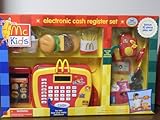 Why do McGriddles, that tasty treat from McDonald’s that consists of egg, cheese, and bacon lovingly wrapped around two syrup-soaked pancakes, taste so good – and as a result, makes us happy?
Why do McGriddles, that tasty treat from McDonald’s that consists of egg, cheese, and bacon lovingly wrapped around two syrup-soaked pancakes, taste so good – and as a result, makes us happy?
It may surprise you that a STUDY ON THE NEUROSCIENCE OF MCGRIDDLES has shown that our happiness about McGriddles is not related at all with the taste of the McGriddle. McDonald’s could serve us cardboard-wrapped cardboard, and it would be happily accepted just as well (assuming it was edible, of course).
Okay, the study wasn’t actually about McGriddles, but the concept still holds true: the part of our brain that responds most to happy outside stimuli loves it when we eat. Eating is fuel. Eating is sustenance. (And let’s face it – eating is fun!) Just like bad sex, where even bad sex is better than no sex at all, even bad food has some benefit to us.
So because our brain is telling us that eating equals happiness, McDonald’s McGriddles also equal happiness.
Duke scientists proved this with mice. They bred a set of mice that had no taste buds that could tell the difference between regular water and sugar water (the sugar water, naturally, provides energy and calories vs the regular water).
But when these mice, who couldn’t tell the difference between normal water and the sugar-energy water by taste, started to show a definite preference for the sugar water, the scientists concluded that the mice were naturally drawn solely to the calories. The scientists proved their theory by testing dopamine levels as well, which collaborated their results by showing the sugar-frenzied mice had just as high dopamine levels as normal mice on sugar water did. Calories equal happiness.
In a nutshell, these scientists proved the phrase, “Fat and Happy”.
